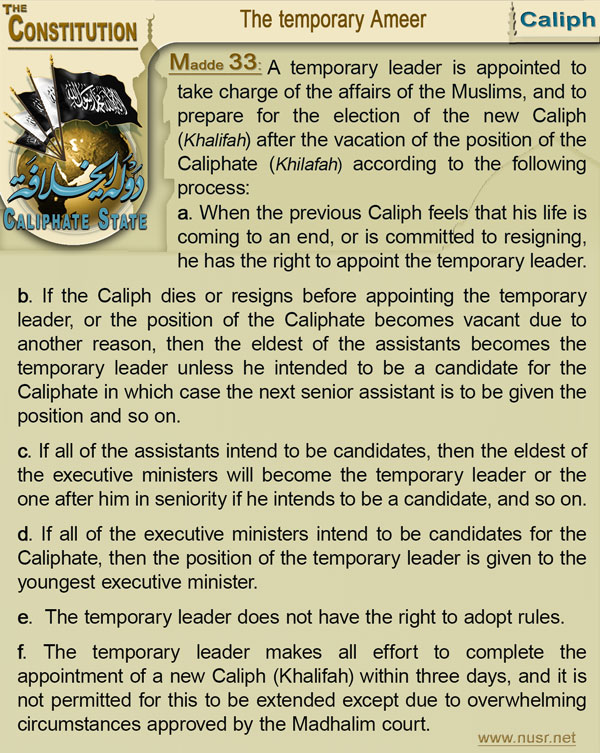
Article 33: A temporary leader is appointed to take charge of the affairs of the Muslims, and to prepare for the election of the new Caliph (Khalifah) after the vacation of the position of the Caliphate (Khilafah) according to the following process:
- When the previous Caliph (Khalifah) feels that his life is coming to an end, or is committed to resigning, he has the right to appoint the temporary leader.
- If the Caliph (Khalifah) dies or resigns before appointing the temporary leader, or the position of the Caliphate (Khilafah) becomes vacant due to another reason, then the eldest of the assistants becomes the temporary leader unless he intended to be a candidate for the Caliphate (Khilafah) in which case the next senior assistant is to be given the position and so on.
- If all of the assistants intend to be candidates, then the eldest of the executive ministers will become the temporary leader or the one after him in seniority if he intends to be a candidate, and so on.
- If all of the executive ministers intend to be candidates for the Caliphate (Khilafah), then the position of the temporary leader is given to the youngest executive minister.
- The temporary leader does not have the right to adopt rules.
- The temporary leader makes all effort to complete the appointment of a new Caliph (Khalifah) within three days, and it is not permitted for this to be extended except due to overwhelming circumstances approved by the Madhalim court.
When the Caliph (Khalifah) feels that his death is close, close to the time that the Caliphate (Khilafah) would become vacant, he may appoint a temporary leader to be responsible for the Muslims’ affairs during the period of steps being taken to appoint the new Caliph (Khalifah). He would undertake his work after the death of the Caliph (Khalifah) and his main work would be to complete the appointment of the new Caliph (Khalifah) within three days.
It is not permitted for the temporary leader to adopt rules, since this is the right of the Caliph (Khalifah) who has been given a pledge by the Ummah. In the same manner, it is not permitted for him to be nominated for the Caliphate (Khilafah) or to support the nominees, since Umar (ra) appointed someone other than those who were nominated for the Caliphate (Khilafah).
The responsibility of this leader ends with the appointment of the new Caliph (Khalifah) since his task was time-constrained to this goal.
The evidence for this is what Umar (ra) did when he was stabbed and this was done without any opposition from the companions and so is considered to be an Ijma’.
Umar (ra) said to the six candidates
«وليصلِّ بكم صهيب هذه الأيام الثلاثة التي تتشاورون فيها»
“Let Suhayb lead you in prayers during the three days of your consultation” and then he said to Suhaib, as mentioned in Tarikh Al-Tabari,
«صل بالناس ثلاثة أيام، إلى أن قال: فإن اجتمع خمسة، ورضوا رجلاً، وأبى واحد، فاشدخ رأسه بالسيف ...»
“lead the people in prayer for three days ..until he said: if five of them agree upon a man while one disagreed, then strike his head with a sword..”. This means that Suhaib was appointed as a leader over them – he was appointed as a leader for the prayer and leadership of the prayer meant leadership over the people. Also, he was given the right to apply the punishment (strike his head) and the only one who can establish punishment by death is the leader.
This issue took place in front of the companions without any dissenters and so it is an Ijma’ that the Caliph (Khalifah) can appoint a temporary leader who undertakes the steps to appoint the new Caliph (Khalifah). In the same manner based upon this it is permitted for the Caliph (Khalifah) during his lifetime to adopt an article which would state that if he died without appointing a temporary leader to oversee the appointment of a new Caliph (Khalifah), someone is to be the temporary leader.
Based upon this, it is adopted that if the Caliph (Khalifah) did not appoint a temporary leader during his terminal illness, then the temporary leader would be the eldest of his assistants as long as they are not a candidate, in which case it would be the next senior in age from his assistants, and so on, and then the executive ministers in the same manner.
This is applied in the event of the removal of the Caliph (Khalifah), so the temporary leader would be the eldest assistant as long as he is not a candidate, and if he is a candidate then the next one in seniority and so on until all the assistants are considered, in which case it would then fall to the eldest executive minister and so on. If all of them want to be candidates then the youngest of the executive ministers is compelled to become the temporary leader.
This leader is different from the one the Caliph (Khalifah) appoints in his place when he goes out for Jihad or a journey, as the Prophet  used to do when he went out for Jihad or the final Hajj, or similar. In this situation the one who is delegated in his stead has the powers that the Caliph (Khalifah) defines for him to take care of the affairs necessitated by the delegation.
used to do when he went out for Jihad or the final Hajj, or similar. In this situation the one who is delegated in his stead has the powers that the Caliph (Khalifah) defines for him to take care of the affairs necessitated by the delegation.

